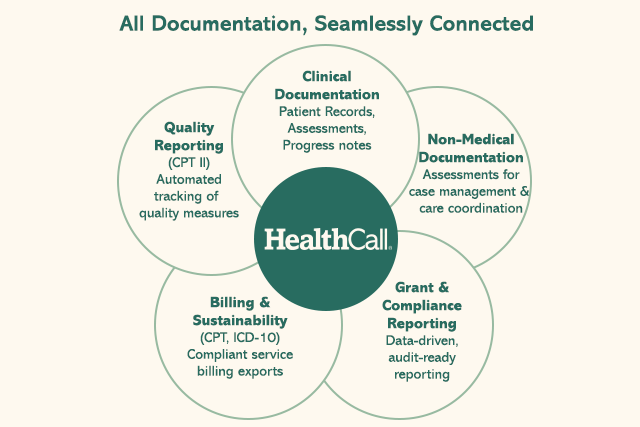Strategic MIH Documentation for State Alignment and Program Growth
Listen to this Article
As work continues across the country to create a standardized minimum data set for mobile  integrated health (MIH), it highlights a familiar paradox: while standardized assessments and procedures are vital, both to ensure best practices and to secure reimbursement, the reality of MIH-CP is that every community is different. HealthCall recently tackled this problem for its state-level initiatives: its patient-centric, longitudinal MIH-CP framework is built for flexibility, allowing individual counties to address their unique needs while also featuring the data collection tools required for reimbursement and state-level regulations.
integrated health (MIH), it highlights a familiar paradox: while standardized assessments and procedures are vital, both to ensure best practices and to secure reimbursement, the reality of MIH-CP is that every community is different. HealthCall recently tackled this problem for its state-level initiatives: its patient-centric, longitudinal MIH-CP framework is built for flexibility, allowing individual counties to address their unique needs while also featuring the data collection tools required for reimbursement and state-level regulations.
Thanks to this ability to embed standardized data collection within a flexible framework, HealthCall’s recent state-level partnerships have empowered participating MIH-CP agencies with tools for better care delivery, reimbursement, and data-driven decision-making, allowing them to quickly and sustainably scale their operational frameworks.
Overcoming Operational Barriers in Missouri
Agencies in Missouri face many barriers in adopting MIH-CP. The cost of a proper documentation system can be daunting for a new agency, but without one, fragmented documentation leads to confusion and wasted time, and inconsistent reporting hinders reimbursement and program growth. Even once an agency has the tools they need, developing an operational infrastructure that meets their patients’ needs can be a frustrating process of trial and error. Facing these challenges, MEMSA – the Missouri Emergency Medical Services Association – has partnered with HealthCall to create a scalable, state-level model that ensures consistency, streamlines data aggregation, and builds financial viability for Missouri’s MIH-CP programs.
MEMSA funding will lower the cost barrier for counties with few resources, helping ensure that every agency can access a robust documentation system. By tracking patient visits in HealthCall’s longitudinal health record, participating agencies can avoid the headaches that come from disorganized visit details, and HealthCall’s built-in reporting tools help them capture both quality metrics and reimbursement-friendly activities. HealthCall also supports MEMSA’s standardized MIH-CP workflow, based on hard-won experience and best practices, which helps agencies implement their documentation software and scale their operations quickly – typically within 4 to 6 weeks – saving them the months or years that it takes to start from scratch.
MEMSA and HealthCall have aligned on a complete dataset based on Missouri’s different types of MIH programs, including fall prevention, chronic disease management, and substance use disorder. HealthCall has designed patient-facing assessments based on that dataset, which is required as part of a standardized workflow for all participating agencies – ensuring reliable, state-wide data collection for reporting. HealthCall is thrilled to support this unprecedented level of standardized data collection as the MIH-CP agencies of Missouri lead the way to more insightful analytics, more seamless collaboration and more sustainable reimbursement.
Easing Documentation Burdens for MIH Providers
Many MIH-CP agencies struggle to meet the documentation standards required by their grants. Many are documenting work in multiple places, sometimes even keeping paper copies that need to be re-entered into reporting systems. This doubled documentation work is inefficient and error-prone, and the resulting frustration raises the risk of employee burnout; it also strains provider relationships by increasing their documentation burden in turn.
To reduce this burden, HealthCall automates the process of data collection and reporting. An example can be found with the MIH-CP agency for Lee County, Florida: by aligning with the agency’s grant requirements and state requirements for NEMSIS data elements, HealthCall integrates the documentation fields that Lee County requires directly into its assessment tools. This allows community paramedics and providers alike to complete patient-facing assessments in real time, eliminating the need to record a temporary copy.
HealthCall streamlines their workflows even further by automatically generating exports – both NEMSIS data, generated in an EMSTARS-compliant manner for state reporting, and grant-required data, sent to the Florida Department of Health for analysis and benchmarking. By eliminating the need to manually copy information into each system, this seamless flow of data greatly reduces the administrative burden of documentation, all while improving compliance, timeliness and accuracy.
Making a Difference Across the Nation
As the requirements for documentation rapidly increase across the country, MIH-CP providers nationwide are faced with a new challenge: how to resolve fragmented documentation, avoid duplicative reporting and mitigate the complexities of operational design while launching, scaling and sustaining their MIH-CP programs. Rather than starting from scratch, HealthCall’s proven operational framework gives these agencies a solid foundation to build on, accelerating implementation and reducing risk.
By aligning with state partners and embedding standardized workflows, assessment tools, and reporting structures directly into its platform, HealthCall is not only easing the documentation burden of frontline providers but also ensuring that programs are well-positioned for reimbursement and compliance with state and payer requirements. By establishing data integrations with state-level agencies, HealthCall helps create a shared infrastructure that allows data to flow seamlessly from point of care to state and national systems, improving long-term viability and allowing providers to properly focus on the heart of their work: patient care.
